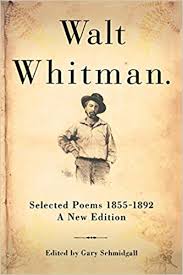Walt Whitman
Listen to the Recess! Clip
| Author | Kevin Shortsleeve |
| Air Date | 5/31/2002 |

Walt Whitman Transcript
It can be said of Walt Whitman that he was a poet who wrote with a voice of childlike boldness and charm. Writing in the mid-1800s, Whitman authored such well-known works as Song of Myself, I Sing the Body Electric, Crossing Brooklyn Ferry, O Captain! My Captain! and the beautiful elegy for Abraham Lincoln, When Lilacs Last in the Dooryard Bloom’d. Like a rebellious adolescent, Walt Whitman struggled always to eschew conventions. He was by-rule, a rule breaker and was incapable of keeping a regular schedule. As a child, this behavior caused him a good bit of trouble – his parents were often annoyed that he ignored meal times – his teachers – incensed at his refusal to try and fit in.
As an author, however, his rejection of normal aesthetic form set him apart and stirred up a great deal of conversation. Like a young child who is totally at ease with himself and comfortable expressing anything he thinks, the adult Whitman wrote with freedom about everything from loafing around to human sexuality. Organizations like the Society for the Suppression of Vice – and certain U.S. Government officials – were most alarmed.
He also had a child’s ability to stop and focus all his attention on what lay before his eyes. His mother remembered that Walt was, in fact, the kind of child who would look at things and wonder deeply about them and remember them vividly for many years. As an adult he wrote: There was a child went forth every day, And the first object he look’d upon, that object he became, And that object became part of him for the day or a certain part of the day, Or for many years or stretching cycles of years.
And it was in revisiting his child self that Whitman often was at his most eloquent. In the poem Out of the Cradle Endlessly Rocking he describes birth as “Out of the ninth month midnight” and then proceeds to return in the poem to his childhood on the beaches of Long Island, calling to mind “The boy ecstatic, with bare feet in the waves, with his hair the atmosphere dallying.” He sings “O Past! O happy Life! O songs of joy!”
Taken as a whole, Whitman’s canon is optimistic – and celebratory – of all things – from birth to death. Like a fascinated infant, he looked at all his world with wonder. He once wrote, “Every square inch of space – is a miracle.” And Whitman biographer Catherine Reef reminds us just how apropos it was to have a celebratory bard such as Whitman writing at that time in our nation’s history. She says of Whitman’s birth in 1819, “It was a hopeful, exciting time to be born. The wars with England were over, and the United States were at peace. Settlers were moving west… Democratic government was still a new experiment. The boy and his nation could grow up together.